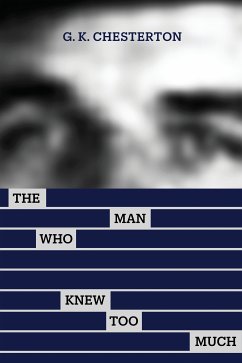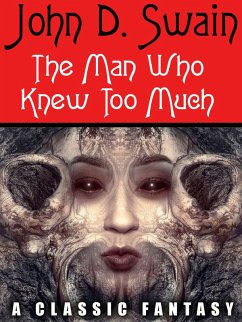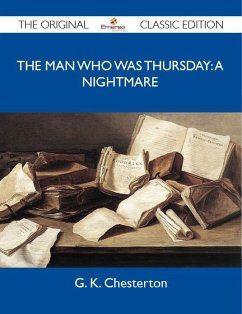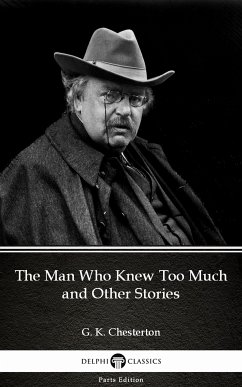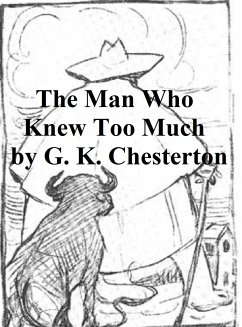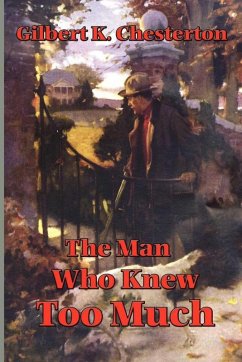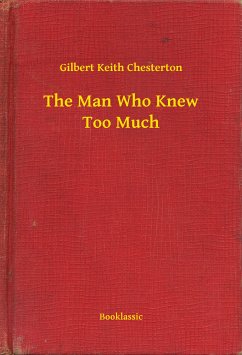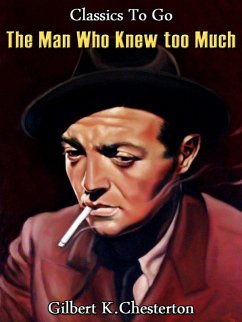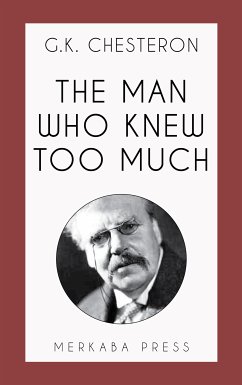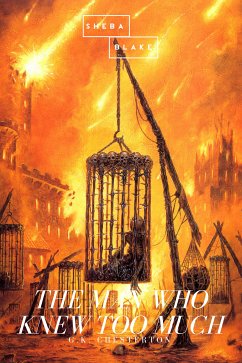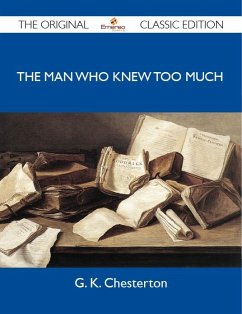
The Man Who Knew Too Much - The Original Classic Edition (eBook, ePUB)

PAYBACK Punkte
2 °P sammeln!
G.K. Chesterton was happy to do some spoofery of the deductive detective genre -- his detectives seemed to depend more on the knowledge of human nature. One good example is Horne Fisher, the star character who solves bizarre little mysteries because he knows too much... and all the wrong things. The first story opens with a reknowned book critic stumbling across a dead man with his head bashed on. Fortunately Fisher is fishing nearby, and is able to deduce who killed the poor man, when, and cleverly figures out the best (and most theatrical) way to get results. In each story, Horne deals with ...
G.K. Chesterton was happy to do some spoofery of the deductive detective genre -- his detectives seemed to depend more on the knowledge of human nature. One good example is Horne Fisher, the star character who solves bizarre little mysteries because he knows too much... and all the wrong things.
The first story opens with a reknowned book critic stumbling across a dead man with his head bashed on. Fortunately Fisher is fishing nearby, and is able to deduce who killed the poor man, when, and cleverly figures out the best (and most theatrical) way to get results.
In each story, Horne deals with another strange mystery -- the framing of an Irish prince freedom fighter, the vanishing of a priceless coin, a man killed off in the Middle East, an eccentric rich man dies during an obsessive fishing trip, another vanishes during an ice skate, a bizarre dispute over an estate, and most shockingly, a statue crushing his own uncle...
Chesterton was a good mystery writer. He could spin up bizarre little crimes (murder, theft, treachery) for a variety of colourful reasons, from the political to purely psychological. The Man Who Knew Too Much is a good example of that, and it shows Chesterton veering into more politically-charged territory than in his other mysteries, with the Irish-English conflict, spies and impending war.
But these mysteries also have Chesterton the philosopher/theologian/thinker. He writes in colourful, poetic prose (as if the world were steeped in wine rather than blood), and has brief moments where Horn muses on human nature.
Patriotism is not the first virtue. Patriotism rots into Prussianism when you pretend it is the first virtue, he remarks at one point, as an example. Through him, Chesterton gives us brief little insights into what he knows too much of -- a worldview remarkably simple, but very insightful.
The Man Who Knew Too Much is an odd kind of detective -- instead of the quirky detectives or deep thinkers, Horn is rather melancholy and plaintive, almost tormented by his own knowledge. This comes to a peak in the bittersweet final story, where Horne finds himself in a wretched situation, with shocking results.
The Man Who Knew Too Much is a solid collection of detective stories, but underlying the mysteries are Chestertons deeper looks at human nature. Excellent reading.
The first story opens with a reknowned book critic stumbling across a dead man with his head bashed on. Fortunately Fisher is fishing nearby, and is able to deduce who killed the poor man, when, and cleverly figures out the best (and most theatrical) way to get results.
In each story, Horne deals with another strange mystery -- the framing of an Irish prince freedom fighter, the vanishing of a priceless coin, a man killed off in the Middle East, an eccentric rich man dies during an obsessive fishing trip, another vanishes during an ice skate, a bizarre dispute over an estate, and most shockingly, a statue crushing his own uncle...
Chesterton was a good mystery writer. He could spin up bizarre little crimes (murder, theft, treachery) for a variety of colourful reasons, from the political to purely psychological. The Man Who Knew Too Much is a good example of that, and it shows Chesterton veering into more politically-charged territory than in his other mysteries, with the Irish-English conflict, spies and impending war.
But these mysteries also have Chesterton the philosopher/theologian/thinker. He writes in colourful, poetic prose (as if the world were steeped in wine rather than blood), and has brief moments where Horn muses on human nature.
Patriotism is not the first virtue. Patriotism rots into Prussianism when you pretend it is the first virtue, he remarks at one point, as an example. Through him, Chesterton gives us brief little insights into what he knows too much of -- a worldview remarkably simple, but very insightful.
The Man Who Knew Too Much is an odd kind of detective -- instead of the quirky detectives or deep thinkers, Horn is rather melancholy and plaintive, almost tormented by his own knowledge. This comes to a peak in the bittersweet final story, where Horne finds himself in a wretched situation, with shocking results.
The Man Who Knew Too Much is a solid collection of detective stories, but underlying the mysteries are Chestertons deeper looks at human nature. Excellent reading.
Dieser Download kann aus rechtlichen Gründen nur mit Rechnungsadresse in A, D ausgeliefert werden.




